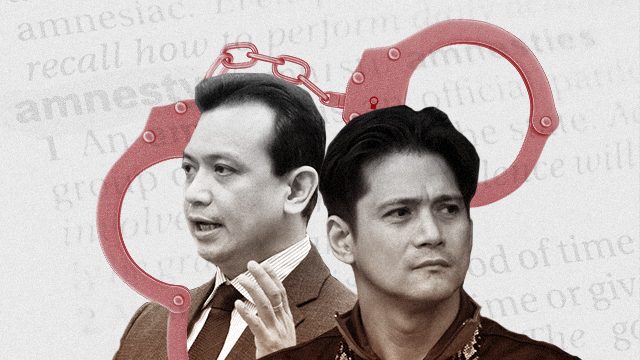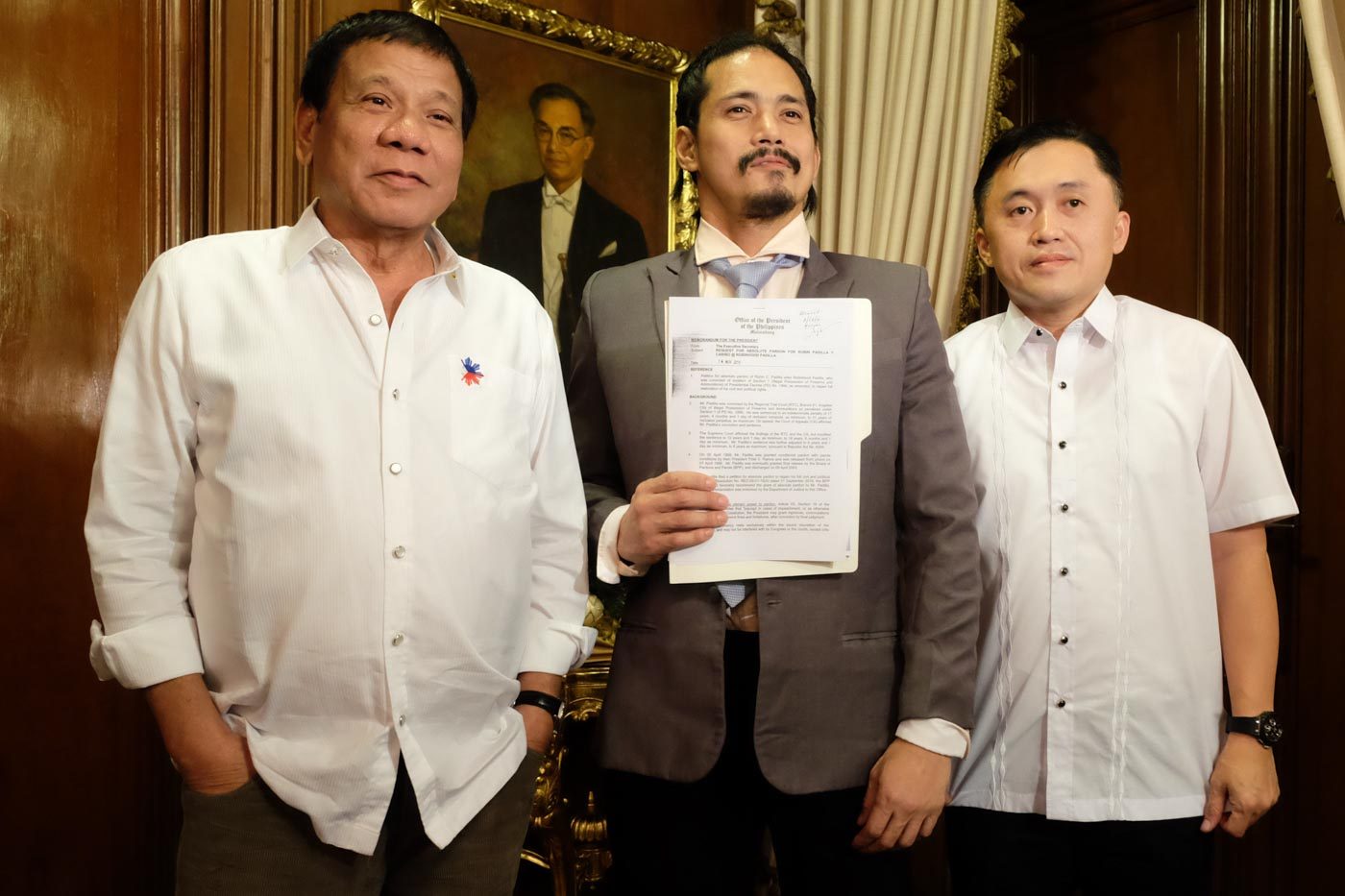SUMMARY
This is AI generated summarization, which may have errors. For context, always refer to the full article.

MANILA, Philippines (UPDATED) – A sidelight of the unfolding drama in the Senate was the verbal scuffle between actor Robin Padilla and beleaguered Senator Antonio Trillanes IV last Wednesday, September 5.
In the immediate aftermath of President Rodrigo Duterte’s voiding of Trillanes’ amnesty, Padilla, a staunch Duterte supporter, made a scene. He dared Trillanes to come out of the Senate building and be man enough to face in court the charges against him.
The senator shrugged off Padilla’s cinematic rants, saying that the actor was acting “like a kid.”
Trillanes has sought refuge in his Senate office since Tuesday, September 4, when news broke on Duterte’s order that was signed on August 31. (LOOK: Inside Trillanes’ ‘home’ in the Senate)
Both Padilla and Trillanes share a similar history of spending jail time, and in particular, having their cases heard at the Makati Regional Trial Court.
Their cases, however, are very different. Here’s what you need to know about them:
The crimes: Loose firearms vs rebellion
Padilla was convicted for illegal possession of firearms in 1994. Police caught him with unlicensed revolvers and an M-16 baby Armalite rifle after he fled from a hit-and-run accident involving a balut vendor.
The so-called “Bad Boy of Philippine Cinema” was first arrested in 1992 after police investigators recovered unlicensed high powered firearms with live ammunition in his San Lorenzo Village residence during a raid. He was cleared of these charges a year later after posting bail.
On the other hand, then Lt. Senior Grade Trillanes of the Philippine Navy was charged in court for his involvement in the 2003 Oakwood mutiny and the 2007 Manila Peninsula siege.
The trials: Civilian vs military
Padilla was tried in a civilian court, where he was found guilty and was first sentenced to 17-21 years in prison. The Supreme Court upheld his conviction in 1997, but shortened the actor’s jail term to 10-18 years.
He had served 2 years in prison before he was granted conditional pardon by former president Fidel Ramos in April 1998. The pardon meant that he was out on parole, but could not exercise, in full, his civil and political rights, including his right to vote.
On the other hand, Trillanes, a military officer back then, underwent court-martial proceedings over the 2003 coup attempt.
Presidential Decree No. 1952 stated that “members of the Armed Forces of the Philippines and the Integrated National Police accused of any crime or offense are triable only in the appropriate courts-martial.”
The distinction between the courts is due to varying offenses considered under civilian and military laws. For instance, desertion is deemed as a criminal offense under military law only, but does not apply to civilians.
Trillanes was first detained for almost 7-and-a-half years following his arrest for the 2003 Oakwood mutiny. He ran, and won, as senator in 2007 while in jail.
How they got away: Amnesty vs pardon
Trillanes and Padilla have been freed from the previous charges leveled against them: the actor via a presidential pardon, and the former soldier through amnesty.
A pardon “relieves the offender from the consequences of an offense of which he has been convicted.” It does not automatically restore one’s political rights, nor does it absolve the person from paying civil indemnity. (READ: Why Robin Padilla couldn’t join Mariel in the US for baby’s birth)
Hence, Padilla was not able to fully exercise his rights even after receiving pardon in 1998.
It was only in November 2016 when Padilla was granted absolute clemency by President Duterte.
This restored, in full, his civil and political rights. His lawyer Rudolf Jurado and manager Betchay Vidanes filed for absolute pardon on behalf of Padilla earlier that year.
The granting of a pardon is an executive power of the President to commute sentences in criminal cases. It presupposes that the person pardoned has, in a private act, “pleaded and proved” his admission of guilt.

Amnesty is a different case.
Members of the Armed Forces, Philippine National Police, and other Magdalo members involved in previous coup attempts under the Arroyo government were granted amnesty by former president Benigno Aquino III through Proclamation No. 75. (DOCUMENTS: DND confirms Trillanes applied for amnesty)
Granted by the President with the concurrence of Congress, amnesty abolishes a crime, and is used primarily as tool in political settlements with rebel movements.
Amnesty “looks backward and abolishes and puts into oblivion the offense itself.” (READ: FAST FACTS: What is amnesty?)
In the case of Trillanes, this means that after then president Aquino granted him amnesty, the coup and rebellion charges against him were immediately dismissed. (READ: Makati court can’t just reopen Trillanes case – IBP) – Rappler.com
Add a comment
How does this make you feel?
There are no comments yet. Add your comment to start the conversation.